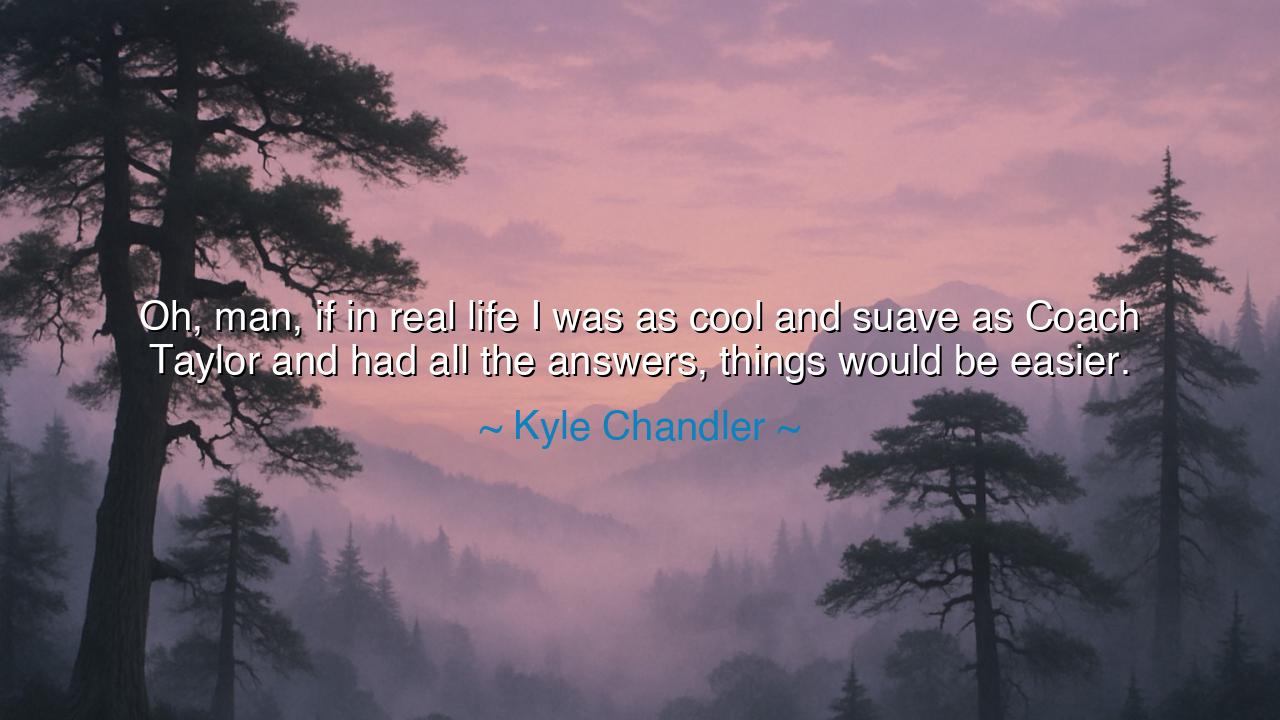
Oh, man, if in real life I was as cool and suave as Coach Taylor
Oh, man, if in real life I was as cool and suave as Coach Taylor and had all the answers, things would be easier.






In the journey of life, we often look to figures who seem to have it all together—those whose composure, wisdom, and leadership appear flawless, as if they hold the answers to every challenge life throws their way. Kyle Chandler’s words, "Oh, man, if in real life I was as cool and suave as Coach Taylor and had all the answers, things would be easier," reflect this universal desire for certainty and control, especially when faced with life’s complexities. Coach Taylor, a character from the popular series Friday Night Lights, embodies the ideal of a steady and wise leader, someone who seemingly knows the right path forward at all times. Chandler’s statement acknowledges the allure of such an image and the underlying struggle that most face: how do we navigate life with grace and confidence when we don’t have all the answers?
In the ancient world, this quest for wisdom and leadership was not new. The role of the sage or the leader was a position of great reverence, often portrayed as one who not only guided others but possessed a deep, unshakable understanding of the world. Socrates, for example, was celebrated for his wisdom, though he himself famously claimed that he knew nothing. His wisdom came not from having all the answers but from his ability to question, to listen, and to adapt his understanding based on new experiences. Like Coach Taylor, Socrates’ greatness lay in his steadfastness and ability to guide others through their own challenges, not through rigid answers, but through the power of reflection and dialogue. Chandler’s longing for the confidence and clarity of his fictional counterpart echoes the desire for clarity and certainty in our own lives—something that the ancient philosophers taught us can only be found through continuous learning and self-awareness.
Similarly, the Roman emperor Marcus Aurelius, whose stoic philosophy shaped much of Western thought, faced the same struggles. He was often regarded as a man of immense wisdom and stoic calm during times of crisis. However, in his Meditations, Aurelius admitted that the path of a ruler was filled with doubt, struggle, and moments of deep uncertainty. His inner strength, much like the leadership Chandler admires in Coach Taylor, did not come from having all the answers, but from embracing life’s challenges with resilience and a commitment to doing his best, even when clarity seemed out of reach. The Stoic belief that we cannot control external circumstances, but can only control our response, mirrors the quality Chandler sees in his character. Strength and wisdom, Aurelius teaches, are not about knowing everything; they are about knowing how to act with integrity, even in the face of unpredictability.
Chandler’s yearning for certainty is also echoed in the story of King David in the Bible, a figure who faced constant challenges as he sought to lead the people of Israel. Though David was revered for his courage and faith, he was also deeply human—facing moments of doubt and fear throughout his reign. What set him apart was his ability to turn to faith and prayer in times of turmoil, seeking guidance not from external answers but from his own relationship with the divine. His story reminds us that even the greatest leaders do not always have all the answers; what makes them great is their ability to lead through faith, humility, and a willingness to adapt. Like Chandler’s Coach Taylor, David’s true power lay not in his unflappable demeanor but in his resilience and the belief that each step forward, no matter how uncertain, was an opportunity to learn and grow.
The lesson Chandler’s reflection offers us is profound: we do not need to have all the answers to be effective leaders or wise individuals. In fact, wisdom often comes from acknowledging our vulnerabilities and limitations. The ancients taught that true greatness comes not from possessing all the answers, but from having the strength to lead through uncertainty, to act with integrity, and to approach challenges with a willingness to learn. In today’s world, as in the ancient world, the pressure to appear flawless, to have all the answers, can be overwhelming. But the true measure of wisdom lies in our ability to adapt, to learn from each moment, and to guide others through example rather than perfection.
In practical terms, this means that we should not seek to be infallible but should embrace the uncertainty that comes with leadership and life. Instead of trying to have all the answers, we must focus on being present, adaptable, and resilient in the face of life’s challenges. Just as Coach Taylor guides his team not through perfect knowledge, but through steadfastness, compassion, and self-belief, we too can find strength in our imperfections. Let us not be afraid of not having all the answers, for it is in the search for understanding that true leadership is forged.
Ultimately, Chandler’s longing for the cool, composed figure of Coach Taylor speaks to the universal desire for certainty and the wisdom of those who seem to have it all figured out. But the true path to greatness, as the ancients knew, lies not in perfect knowledge but in the continuous pursuit of understanding, the ability to lead with integrity in moments of doubt, and the courage to move forward, even when the way ahead is unclear. Just as Socrates, Marcus Aurelius, and David found their strength not in having all the answers, but in embracing the journey, so too must we.






AAdministratorAdministrator
Welcome, honored guests. Please leave a comment, we will respond soon